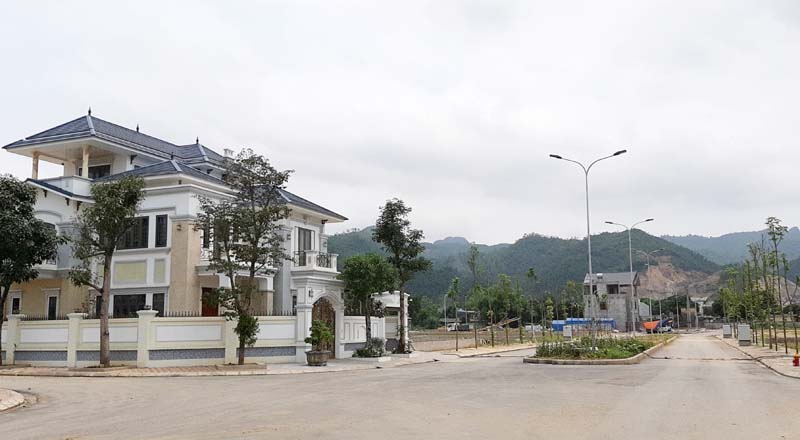
(HBO) - In the first quarter of 2019, Hoa Binh’s State budget collection completed 22 percent of the year’s target, up 4 percent year-on-year.
 The residential area project No.7 in Thinh Lang
ward of Hoa Binh city has helped create revenue from land use auctions for the
State budget.
The residential area project No.7 in Thinh Lang
ward of Hoa Binh city has helped create revenue from land use auctions for the
State budget.
Especially, the work made by the provincial Department
of Customs saw good results. The agency collected 69 billion VND in the first
three months of the year, equal to 53 percent of the plan set for the whole
year by the provincial People’s Council.
The department was requested to promote administrative reform and facilitate
enterprises’ operation to increase budget collection.
The province’s State budget collection is hoped to reach 4 trillion VND, up
about 200 billion VND compared to the target set in the resolution of the
provincial People’s Council.
The provincial Department of Finance has raise the
idea of accelerating the budget collection through implementing the two groups
of key solutions, striving to complete the budget revenue estimation in 2019
and the target of 5 trillion VND set in the resolution of the 16thprovincial Party Congress.
Attention will be paid to supporting enterprises in developing their production
and business.
Revenue will also be made from collecting land use fees and auctions. Compared
to other provinces, Hoa Binh’s revenue from land is very modest, reaching about
700 billion VND, only half of the land use fee of Son La province. If the
locality collects about 800 billion VND from land-related services and the
total revenue from districts and Hoa Binh city increases about 7 percent, it is
likely to realise the budget collection target of 5 trillion VND by 2020.
The provincial
People’s Committee has devised many measures to improve business environment and
overcome difficulties facing local enterprises’ production and business, as
well as support investors to soon put their projects into operation, towards
creating sustainable and stable revenue resources for the State budget. /.
Dao Village’s honey – a product certified with a 3-star OCOP (One Commune One Product) rating by Thong Nhat Agricultural Cooperative in Dao Village (Hoa Binh City) – is highly regarded by consumers for its quality, richness, and variety in packaging. The distinctively sweet taste of Dao Village’s honey leaves a lasting impression on anyone who has tried it.
In alignment with Project No. 07-DA/TU, issued by the Hoa Binh provincial Party Committee on November 1, 2021, Lac Thuy district has actively promoted investment and supported the sustainable development of its industrial and handicraft sectors during the 2021–2025 period. Alongside this, the district has remained committed to preserving and revitalising traditional craft villages.
Located in the northern part of Lac Thuy district, with a temperate climate and fertile soil, Phu Thanh commune has great potential and advantages in growing tea. The long-standing experience, combined with strict adherence to organic farming practices in the tea gardens, ensures that the dried tea products from Phu Thanh and Lac Thuy as a whole are sold out immediately upon production, providing a stable and prosperous life for the local people.
Amid efforts to streamline the administrative apparatus, Hoa Binh province has intensified measures to address challenges in land clearance, resettlement support, and infrastructure investment, aiming to speed up the progress of key projects.
Hoa Binh province has posted an unprecedented economic growth rate of 12.76% in the first quarter of 2025, marking its highest quarterly performance to date and positioning it as the second fastest-growing locality in the country, trailing only Bac Giang province.
Under current regulations, products in the One Commune – One Product (OCOP) programme that are rated three stars or higher must undergo re-evaluation every three months. However, in reality, some of these products fail to consistently meet the required standards, raising concerns about the sustainability of their OCOP certification. This underscores the urgent need for producers to enhance product quality and gradually develop their OCOP products into strong, marketable brands.



 The residential area project No.7 in Thinh Lang
ward of Hoa Binh city has helped create revenue from land use auctions for the
State budget.
The residential area project No.7 in Thinh Lang
ward of Hoa Binh city has helped create revenue from land use auctions for the
State budget.